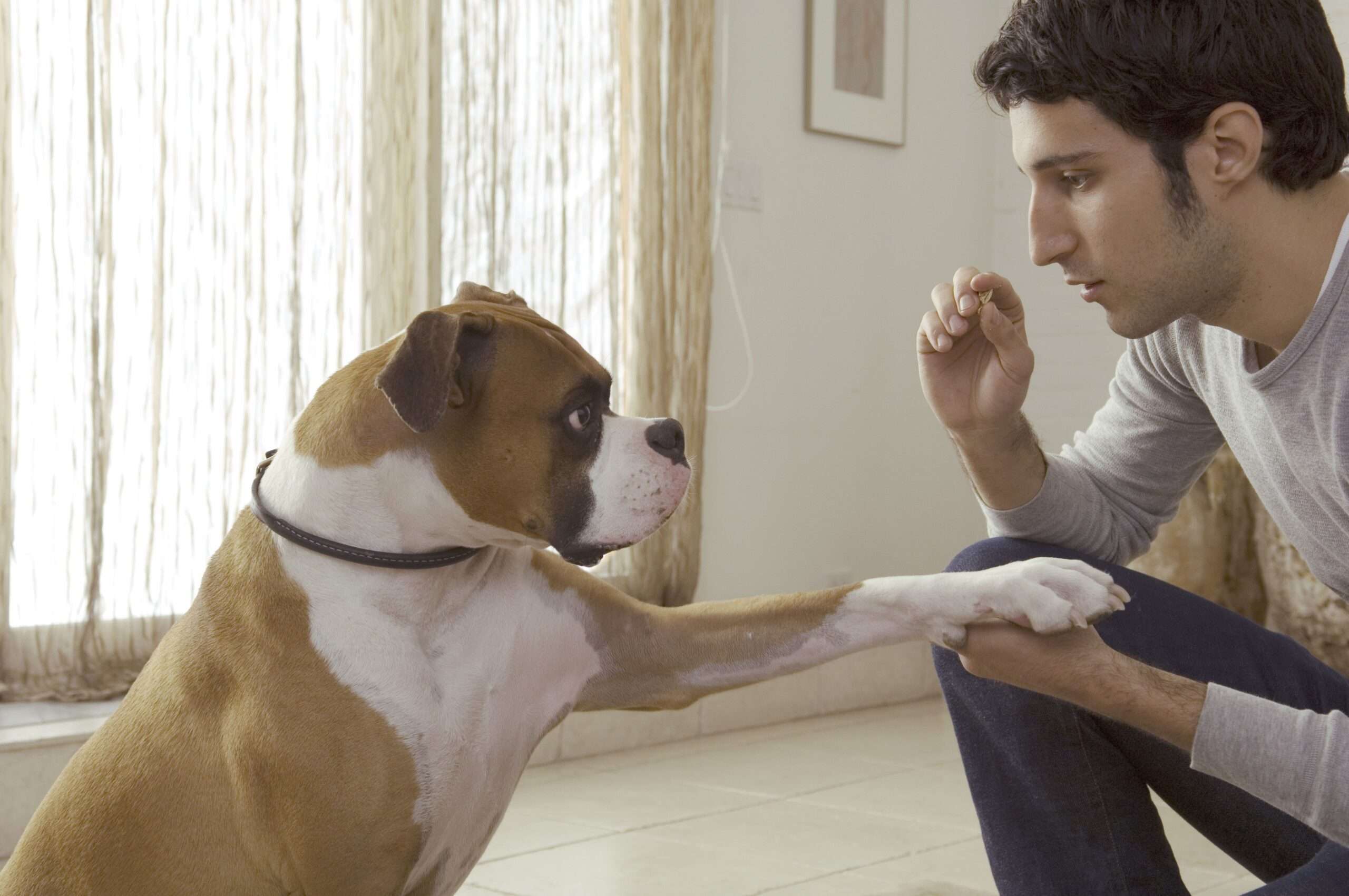Key Takeaways:
- Understanding the root cause of your dog's fear of strangers is crucial in helping them overcome it.
- Socialization plays a key role in desensitizing your dog to unfamiliar people and situations.
- Positive reinforcement training techniques can be highly effective in building your dog's confidence around strangers.
- Creating a calm and safe environment for your dog when encountering strangers can help alleviate their anxiety.
- Seeking professional help from a certified dog trainer or behaviorist may be necessary for severe cases of fear towards strangers.
Does your furry friend cower in fear at the sight of strangers? Is their anxiety causing them to miss out on social interactions and experiences? If so, you're not alone. Many dog owners face the challenge of helping their pets overcome their fear of strangers. But fear not, because understanding and addressing this issue can lead to a happier, more confident pup. In fact, studies show that dogs who are comfortable around strangers tend to have higher overall well-being and enjoy a better quality of life. So, if you're ready to unlock the secrets of helping your dog conquer their fears and embrace new human connections, keep reading! Together, we'll explore effective strategies and techniques that will empower your pup to feel safe and secure in any situation. Get ready to witness your dog's transformation into a social butterfly!
What Does It Mean When a Dog Is Afraid of Strangers?
Understanding the Fear
When a dog is afraid of strangers, it means that they feel anxious or scared when encountering people they don't know. This fear can stem from various reasons, such as past traumatic experiences, lack of socialization during their early development stages, or genetic predisposition to anxiety. Just like humans, dogs have their unique personalities and fears.
It's important to remember that being afraid of strangers is a common behavior in dogs and doesn't mean there's something wrong with them. However, it can impact their quality of life and limit their ability to enjoy new experiences or interact with unfamiliar people.
Reasons Why Some Dogs Feel Scared or Anxious Around People They Don't Know
Past Traumatic Experiences
Dogs might develop a fear of strangers if they've had negative encounters in the past. For example, if a dog has been mistreated by someone they didn't know before, they may associate all unfamiliar people with that negative experience. These dogs may become fearful as a defense mechanism to protect themselves from potential harm.
Lack of Socialization
Socialization plays a crucial role in shaping a dog's behavior and temperament. If a dog hasn't been exposed to different people during their critical socialization period (usually between 3-14 weeks old), they may grow up feeling uneasy around strangers. Without positive experiences and gradual exposure to new faces, dogs may perceive unfamiliar individuals as threats.
How Can You Tell If a Dog Is Fearful of Strangers?
Dogs communicate their emotions through body language and behavior cues. By observing these signs, you can determine if your dog is afraid of strangers. Here are some common indicators:
1. Cowering or Trembling
A fearful dog may cower or tremble in the presence of strangers. They might try to make themselves appear smaller by lowering their body and tucking their tail between their legs.
2. Avoidance Behavior
If a dog is afraid, they may actively avoid contact with unfamiliar people. They might hide behind furniture, retreat to another room, or try to escape the situation altogether.
3. Excessive Barking or Growling
Fearful dogs may bark or growl at strangers as a way to communicate their discomfort and establish distance. This behavior serves as a warning signal that they feel threatened and want the person to stay away.
Steps to Help Your Dog Overcome Its Fear of Strangers
If your dog is afraid of strangers, there are steps you can take to help them overcome their fear and become more comfortable around unfamiliar people:
1. Gradual Exposure
Start by exposing your dog to strangers in controlled environments where they feel safe, such as a quiet park or your backyard. Gradually increase the level of exposure over time, allowing your dog to build positive associations with new people.
2. Positive Reinforcement
Reward your dog with treats, praise, and affection whenever they exhibit calm behavior around strangers. Positive reinforcement helps them understand that being around unfamiliar people can lead to enjoyable experiences.
3. Seek Professional Help
If your dog's fear of strangers persists despite your efforts, consider consulting a professional dog trainer or animal behaviorist who specializes in fear-based behaviors. They can provide tailored guidance and techniques to help your dog overcome their fear.
Can Training and Socialization Make Dogs More Comfortable Around Unfamiliar People?
Yes, training and socialization can significantly improve a dog's comfort level around unfamiliar people. By exposing dogs to positive experiences with strangers and teaching them appropriate behaviors, they can learn to trust and feel more at ease in such situations.
Training can help dogs understand what is expected of them when encountering strangers, such as sitting calmly or offering a paw for a handshake. Socialization exposes dogs to different types of people, ensuring they become familiar with various appearances, voices, and movements.
Resources Available to Assist Dogs in Overcoming Their Fear of Strangers
If you're looking for additional resources to assist your dog in overcoming their fear of strangers, consider the following:
1. Professional Dog Trainers
A professional dog trainer can provide personalized guidance and training techniques tailored to your dog's specific needs. They have experience working with fearful dogs and can create a customized plan to help your furry friend overcome their fear.
2. Animal Behaviorists
An animal behaviorist specializes in understanding animal emotions and behaviors. They can assess your dog's fear of strangers from a scientific perspective and develop strategies based on behavioral science principles.
3. Local Dog Socialization Classes
Enroll your dog in local socialization classes where they can interact with other dogs and meet new people in a controlled environment. These classes often employ positive reinforcement techniques that promote confidence-building and reduce fear-based behaviors.
Remember, patience is key when helping your dog overcome their fear of strangers. With time, consistent training, and positive experiences, many dogs can learn to feel more comfortable around unfamiliar faces.
1. Professional Dog Trainers
1.1 Certified Canine Behaviorists
Certified canine behaviorists are experts in understanding and modifying dog behavior. They have undergone extensive training and education to specialize in helping dogs overcome their fear of strangers. These professionals can assess the specific triggers that cause fear in dogs and develop personalized training plans to address these issues. Through positive reinforcement techniques, they teach dogs new behaviors and help them build confidence when encountering unfamiliar people.
Benefits of Working with Certified Canine Behaviorists:
- Expertise: Certified canine behaviorists possess a deep understanding of dog psychology and behavior, allowing them to tailor their approach to each individual dog.
- Customized Training Plans: These professionals create personalized training plans based on the unique needs of the dog, ensuring effective results.
- Long-Term Support: They provide ongoing support throughout the training process, helping both the dog and their owner navigate challenges and achieve lasting behavioral changes.
2. Desensitization and Counterconditioning Techniques
Desensitization and counterconditioning are powerful techniques used by dog trainers to help dogs overcome their fear of strangers. The goal is to gradually expose the dog to situations involving strangers while pairing those experiences with positive associations, such as treats or praise. This helps the dog associate strangers with positive outcomes, gradually reducing their fear response.
2.1 Desensitization
Desensitization involves exposing the dog to controlled situations where they encounter strangers at a distance that doesn't trigger fear or anxiety. Over time, the distance is gradually decreased until the dog becomes comfortable being closer to strangers without feeling fearful.
2.2 Counterconditioning
Counterconditioning focuses on changing the emotional response of the dog towards strangers from fear or anxiety to a positive one. This is achieved by pairing the presence of strangers with highly rewarding experiences, such as treats or playtime. Through repetition, the dog learns to associate strangers with positive feelings, gradually overcoming their fear.
Benefits of Desensitization and Counterconditioning:
- Gradual Progress: These techniques allow dogs to progress at their own pace, ensuring they feel safe and comfortable throughout the process.
- Positive Associations: By associating strangers with positive experiences, dogs learn to view them in a more positive light, reducing fear and anxiety.
- Lasting Results: Desensitization and counterconditioning techniques aim to create long-term behavioral changes by addressing the root cause of fear rather than just suppressing symptoms.
Remember, it's important to consult with a professional dog trainer or behaviorist before attempting these techniques to ensure proper guidance and safety for both you and your furry friend.
In conclusion, helping your dog overcome its fear of strangers is possible with patience and positive reinforcement. By gradually exposing your dog to new people in a calm and controlled manner, you can help them build confidence and develop trust.
How do I stop my dog from being scared of strangers?
To encourage your dog to make eye contact with you or walk calmly on a loose leash, reward them. If your dog becomes anxious, rushing away or panicking will only worsen their anxiety. If your dog reacts immediately, it means the stranger is probably too close, so calmly guide your dog away and reward them when they listen to you.
How do I build my dog's confidence with strangers?
While walking, pay close attention to your dog and as soon as they notice a person, calmly acknowledge their awareness with a positive word like 'yes' or 'good,' and then give them a treat. It's best to continue encouraging your dog while giving the reward and also move them away from the stranger.
Can a fearful dog be cured?
Yes, it is possible for fearful dogs to improve over time with training and building trust. However, it is unlikely that they will become outgoing if they are naturally nervous or shy.
How do I desensitize my dog to visitors?
Encourage your dog to maintain a happy distance when greeting or reacting to visitors by throwing treats away from your location. Use a treat that your dog finds irresistible and gradually toss them further and further away.
Is it too late to socialize my dog?
There is no specific information provided in the text to paraphrase.
Why is my dog scared of strangers?
A lot of dogs feel afraid when they are around unfamiliar people. Some people often assume that these dogs have experienced abuse in the past. However, this is generally not true. In most cases, if a dog is afraid of strangers, it is simply because they have not been exposed or accustomed to socializing with them.

















